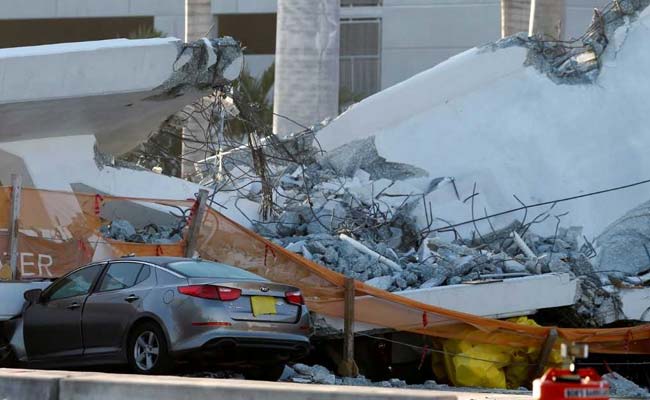
Aerial view shows of the pedestrian bridge that collapsed at Florida International University (Reuters)
MIAMI:
Engineers and state and university officials met hours before a new pedestrian bridge collapsed in southern Florida, killing six people, but concluded a crack in the structure was not a safety concern, Florida International University said on Saturday.
The meeting on Thursday involved FIGG, which is the private contractor for the overall bridge design, the school, Florida Department of Transportation officials and Munilla Construction Management (MCM), which installed the $14.2 million bridge.
A FIGG engineer "concluded there were no safety concerns and the crack did not compromise the structural integrity of the bridge," FIU said in a statement.
About three hours after the meeting ended, the 950-ton bridge collapsed, crushing vehicles stopped at a traffic light on the eight-lane roadway below. At least six people, including three whose bodies were recovered on Saturday, were killed. Police said four vehicles are believed to be still under the collapsed bridge and more bodies may be recovered.
The victims found on Saturday were identified as Rolando Fraga Hernandez, Oswald Gonzalez and Alberto Arias, the Miami-Dade Police Department said in a statement. Police identified a fourth victim who died in hospital as Navarro Brown.
 Police could not be reached for further comment.
Police could not be reached for further comment.
News of the meeting between engineers and officials followed a revelation late on Friday that the engineer overseeing the bridge, which linked the FIU campus with the city of Sweetwater, had called a state official two days before the collapse to report cracks.
However, the voicemail message from FIGG's lead engineer Denney Pate, including his assertion that the cracking posed no safety issue, was not retrieved until Friday, a day after the tragedy, according to the state transportation agency.
Pate did not immediately respond to email queries.
In the message, Pate said his team had observed "some cracking" at one end of the bridge and that repairs were warranted, "but from a safety perspective we don't see that there's any issue there, so we're not concerned about it from that perspective."
He added: "Obviously the cracking is not good and something's going to have to be, ya know, done to repair that."
(Except for the headline, this story has not been edited by NDTV staff and is published from a syndicated feed.)
The meeting on Thursday involved FIGG, which is the private contractor for the overall bridge design, the school, Florida Department of Transportation officials and Munilla Construction Management (MCM), which installed the $14.2 million bridge.
A FIGG engineer "concluded there were no safety concerns and the crack did not compromise the structural integrity of the bridge," FIU said in a statement.
About three hours after the meeting ended, the 950-ton bridge collapsed, crushing vehicles stopped at a traffic light on the eight-lane roadway below. At least six people, including three whose bodies were recovered on Saturday, were killed. Police said four vehicles are believed to be still under the collapsed bridge and more bodies may be recovered.
The victims found on Saturday were identified as Rolando Fraga Hernandez, Oswald Gonzalez and Alberto Arias, the Miami-Dade Police Department said in a statement. Police identified a fourth victim who died in hospital as Navarro Brown.

Workers remove debris from the collapsed pedestrian bridge at Florida International University in Miami (Reuters)
News of the meeting between engineers and officials followed a revelation late on Friday that the engineer overseeing the bridge, which linked the FIU campus with the city of Sweetwater, had called a state official two days before the collapse to report cracks.
However, the voicemail message from FIGG's lead engineer Denney Pate, including his assertion that the cracking posed no safety issue, was not retrieved until Friday, a day after the tragedy, according to the state transportation agency.
Pate did not immediately respond to email queries.
In the message, Pate said his team had observed "some cracking" at one end of the bridge and that repairs were warranted, "but from a safety perspective we don't see that there's any issue there, so we're not concerned about it from that perspective."
He added: "Obviously the cracking is not good and something's going to have to be, ya know, done to repair that."
© Thomson Reuters 2018
(Except for the headline, this story has not been edited by NDTV staff and is published from a syndicated feed.)
Track Latest News Live on NDTV.com and get news updates from India and around the world

